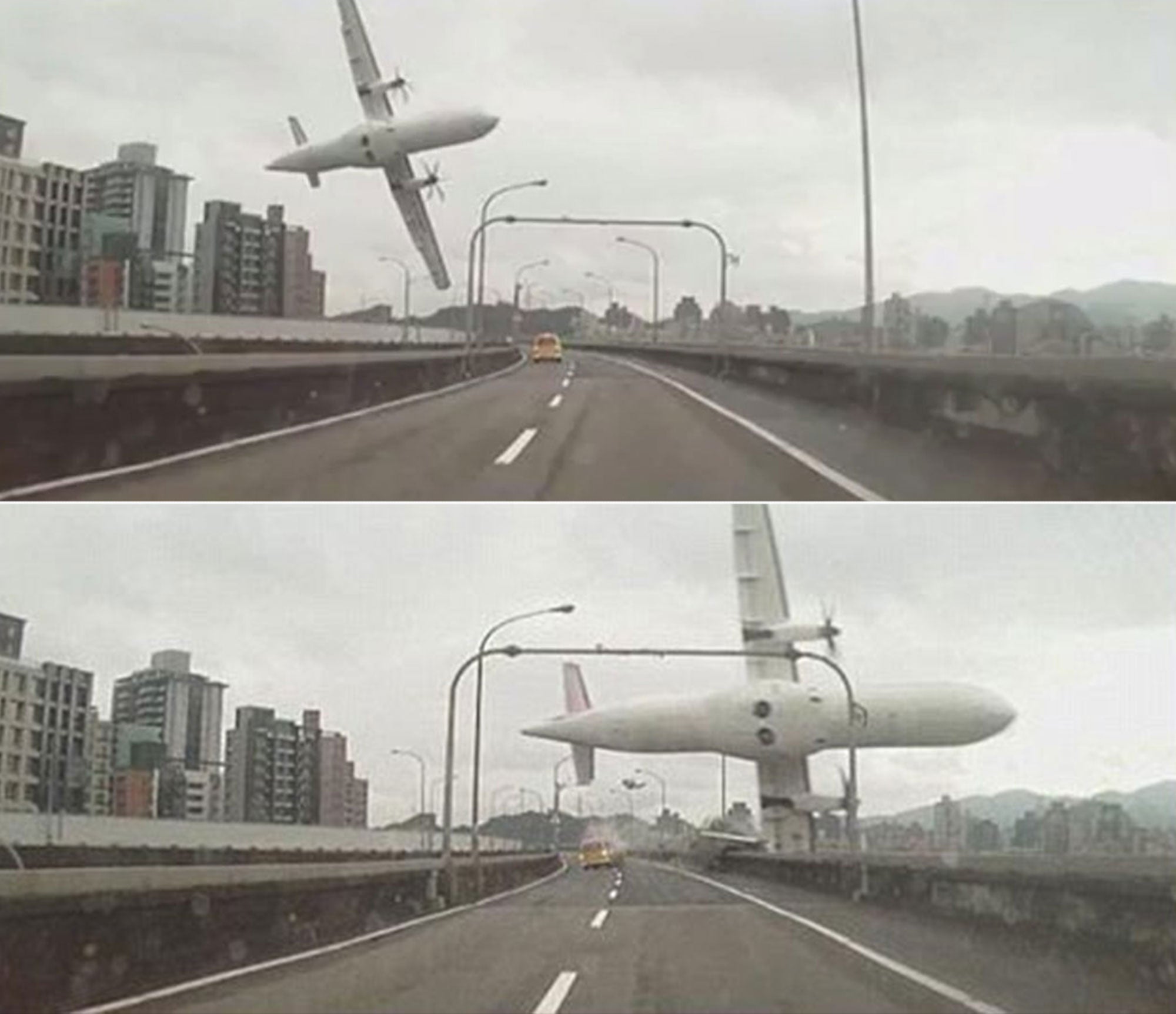Taiwan plane crash: Video footage shows TransAsia flight 235 banking sharply left before clipping bridge and crashing into river
At least 26 people have been killed in the incident, which took place shortly after takeoff

At least 26 people have died in another crash involving an Asian airline.
TransAsia Airways flight GE 235 crashed shortly after take-off from the Taiwanese capital, Taipei. Dramatic images captured the last moments of the flight as it cartwheeled across an elevated highway. The plane came to rest in the city’s river, where rescuers battled to free passengers and crew trapped in the fuselage.
The ATR72 propellor aircraft was bound for Kinmen, just off the coast of mainland China. Of the 53 passengers, 31 were from the People’s Republic. The remaining 22 passengers, and five crew, were Taiwanese. The captain was named as Jianzong Liao, aged 42; the first officer was Zizhong Liu, aged 45.
Flight GE235 had taken off four minutes earlier from the capital’s city centre airport, Songshan. It flew across some very heavily populated districts of the city, then followed the course of the Keelung River for about 1km.
Footage captured by the dashboard camera of a car driving along the riverside Huandong Boulevard shows the aircraft in serious trouble. The plane narrowly avoids striking an apartment block before rolling sharply to the left.
With the aircraft at 90 degrees to level flight, the left-hand wing crushed a taxi; the driver walked away from the scene but is understood to have had some treatment for a head injury. A split-second later, the wing disintegrated as it hit a barrier on the highway and the aircraft spun into the river.
In pictures: TransAsia crash
Show all 10Taiwan’s Aviation Safety Council said: “The aircraft lost contact immediately after took off and crashed into Keelung River.” It was reported that the last words from the flight deck were “Mayday, mayday engine flame out.”
All multi-engine passenger aircraft are designed to be able to climb and fly safely even if power from one engine is lost during take-off.
The fuselage of the aircraft came to rest upside-down in the river. Rescuers in inflatable dinghies pulled 15 survivors, including a two-year-old toddler, from the wreckage before the plane was lifted from the river. As night fell, a huge search-and-rescue operation continued at the crash site.
David Learmount, operations and safety editor at FlightGlobal, said the video showed the plane was “fully stalled” just before the crash.
“If an aeroplane is flying too slowly in level or descending flight it is normally because there is insufficient power to keep the aircraft’s speed up. The question for the investigators is why was there insufficient power? Both propellers were clearly turning, but that does not necessarily mean they were being supplied with sufficient power to fly safely.”
Scott Hamilton, of the Leeham News and Comment website, said: “There will be initial focus on the engines and with it, anything that contributes to flameouts, such as fuel contamination, bird or other foreign object ingestion, and mechanical issues.”
The aircraft type has been in service for 25 years, and is regarded as a reliable workhorse by regional airlines around the world. Stobart Air operates 12 of the type in the British Isles on behalf of Flybe and Aer Lingus.
The plane involved in the crash was under a year old. TransAsia Airways has suffered three previous crashes with the same aircraft type. A total of six flight crew died in accidents in 1995 and 2002 on flights with no passengers on board. In July last year, another ATR72 on a flight from Kaohsiung to Magong crashed short of the runway. Of the 58 people on board, 48 died; the 10 survivors had serious injuries. Five people on the ground were hurt. The Aviation Safety Council has not yet made a final report on that event.
At a press conference, TransAsia Airways’ chief executive, Chen Xinde, apologised for the incident.
Five other ATR72s have been involved in fatal crashes in the past decade.
For an airline to suffer two fatal accidents in quick succession is unusual, and raises questions about the safety culture at TransAsia Airways - as well as Taiwan as a whole. The aviation safety website, AirSafe.com, says that Taiwan’s national carrier, China Airways, has suffered five fatal accidents since 1989. In that time, no UK airline has had a crash involving a large passenger aircraft.
Relative to the number of flights, global aviation has never been safer. But the loss of an AirAsia jet in the Java Sea in late December, as well as the two latest TransAsia Airways crashes, has raised concerned about safety regulation and the responses of pilots to failures in equipment and instrumentation.
In a statement, the British Trade & Cultural Office in Taipei said: “Our thoughts are with the loved ones of those who have lost their lives and with the injured.” The UK does not maintain an embassy in Taiwan, because of political complications.
Subscribe to Independent Premium to bookmark this article
Want to bookmark your favourite articles and stories to read or reference later? Start your Independent Premium subscription today.

Join our commenting forum
Join thought-provoking conversations, follow other Independent readers and see their replies